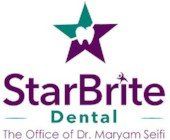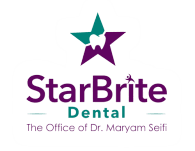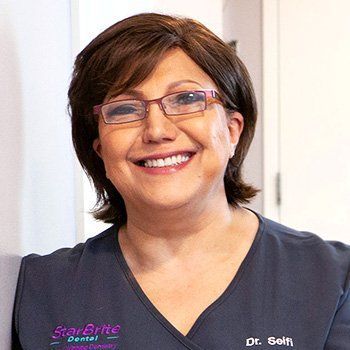Bruxism Symptoms and Solutions
Bruxism Diagnosis and Treatment
Bruxism is the condition that exists if you chronically grind your teeth or clench your jaw. This may happen during the day or only during sleep.
With sleep bruxism, hour after hour, month after month, the teeth grate against each other hundreds of times each night. Meanwhile, the individual sleeps, unaware of the damage that’s accumulating.
When it continues for months or years, a person’s smile can eventually be destroyed. The teeth may be so damaged that they require an extensive overhaul to restore their function and appearance.
Bruxism and Sleep Disorders
Sleep bruxism is considered a type of sleep disorder. Often, a dentist is the first person to identify the signs of this condition. During examinations, they may be looking at teeth that are worn, chipped or fractured. The dental work they placed in the smile a year or two ago may now be fractured or chipped, requiring repair.
Dentists are the best people to treat this problem as well. As we’ll note in a moment, some of the contributing factors of sleep bruxism trace back to dental situations.
Teeth-Grinding Symptoms
Here are some of the signs that could tell a person that they are grinding their teeth at night. Anyone with these symptoms should contact their dentist for an examination:
- Tooth pain
- Tooth sensitivity
- Chipped or cracked teeth
- Worn-down teeth, flat teeth
- Facial pain
- Sore gums
- Jaw stiffness
- Dull headache
- Jaw pain from grinding teeth
- Headache starting at the temples
- Earaches
- Tired or tight jaw or face muscles
- Chewed-up areas inside the cheeks
- Indentations on sides of tongue
Damage Caused by Bruxism
As a person clenches their teeth thousands of times, their jaw muscles tighten spasmodically. Their top and bottom teeth rub back and forth forcefully. Amazingly, this can happen both in the day and during sleep without a person realizing it’s happening.
After years of gnashing, clenching and grinding, it’s common to experience damage like this:
- Dislocation of the jaw
- Jaw locked open
- Jaw locked closed
- Tooth enamel worn away
- Teeth worn flat on top
- Loose teeth
- Chipped teeth
- Fractured teeth
- Broken bridges, crowns and dentures
- TMJ inflammation and pain
- Inflamed jaw muscles
In a very worst-case scenario, bruxism can wear the teeth all the way to the gumline! This is not only detrimental to your oral and overall health, it detracts from your appearance. The only solution then is dentures or dental implants.
It’s vital to treat sleep bruxism as soon as it is noted. Without treatment, it’s possible to lose all or many of the teeth.
What Causes Teeth Grinding?
There are actually many different causes involved in creating this problem. The contributing factors involved can vary greatly from one person to the next. Here are some common ones:
- Stress
- Inability to relax
- Caffeinated drinks or foods
- Alcohol
- An abnormal bite
- Crooked teeth
- Missing teeth
- Sleep apnea
- Poor posture
- A disorder of the TMJ
- Some types of medication
- Smoking
- Parkinson’s Disease
- Huntington’s Disease
With these many different factors from such diverse sources, it’s important to get a correct analysis of factors such as your bite, sleep quality, diet, stress and any tooth or jaw damage you have already experienced. A dentist is your best bet to help you learn how to stop grinding teeth.
Mouth Guard for Teeth Grinding
A teeth-grinding guard can help a person prevent damage to their teeth during bruxism. Many dentists are skilled in creating night guards for teeth grinding that keep the teeth from coming in contact with each other. With this separation, there’s no damage from grinding the teeth in sleep.
Which is the
best mouthguard for grinding teeth? The best one is the teeth-grinding guard that is comfortable for the individual. It should not pop out during the night. It should relieve the soreness of the teeth, muscles or gums, not make them worse. And, of course, any further damage to the teeth should be halted.
Your Teeth-Grinding Guard
Your best mouthguard for grinding teeth may be made from a flexible plastic (acrylic) or a harder, more durable material. Some types of guards can be purchased at a pharmacy but they will never fit as well as a custom-made guard from a dentist.
Buying an over-the-counter guard will also not allow for diagnosis of any problems that might contribute to teeth grinding, such as apnea, an incorrect bite, or loose or missing teeth. None of these contributing factors will be corrected by an over-the-counter guard. At best, it might pause some of the damage.
Correct diagnosis of sleep bruxism and a skilled evaluation of the causes can enable your dentist to fit you with a custom teeth-grinding guard that protects your smile plus your jaw muscles, TMJ and other structures.
When your dentist is skilled in diagnosing this problem, the mouth guard for clenching teeth they provide won’t
interfere with sleep. It can be worn comfortably and snugly all night long.
Children’s Bruxism
It is more common for children to show signs of teeth grinding than adults. Some studies show that 20 percent to 38 percent of children may be destructively clenching their teeth at night. They may wear their baby teeth almost to the gums. It’s important for parents to watch for teeth-grinding damage when they help their children brush their teeth.
Professional Assistance Is Available
If you notice any of these symptoms of clenching teeth in sleep or the damage that results, ask your dentist for an examination to identify any damage you might already have suffered.
At
StarBrite Dental in Rockville, Maryland, our dentists are trained and experienced in treating harmful bruxism, identifying all contributing factors and providing comfortable mouthguards to prevent further damage. They can also address any other related dental issues at the same time. Call our office to schedule an exam.



